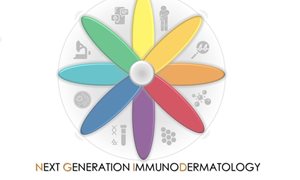
Under the leadership of Ellen van den Bogaard and colleagues of theme Inflammatory diseases, a large consortium is setting up a platform in which materials and technologies will be developed to stimulate research with so-called skin organoids, small pieces of cultured skin. The goal of this is to research the effect of these organoids on the skin and skin diseases. Also drugs can be tested in these organoids. For this purpose the researchers receive a grant of 967K euro from Health Holland.
A well functioning skin plays a very important role in our health. Unfortunately, many people suffer from skin diseases. In the Netherlands alone there are more than 2 million patients with serious chronic inflammatory skin diseases, such as psoriasis and atopic eczema. People's skin models offer many opportunities for research into skin function, skin diseases and drug testing. They are scientifically and ethically indispensable. However, the application of these skin models in fundamental science lags behind, because the standardized, commercially available skin models often turn out to be unsuitable for specific issues and research budgets are not sufficient for the large-scale use of these precious human measurement models.
PAST4FUTURE
That is why researchers from four Dutch experimental dermatology laboratories are setting up a new platform in this project: "Platform for alternative skin models for sustainable future science", or PAST4FUTURE for short. The platform aims to generate general, versatile and sustainable materials and technologies and make them accessible to everyone. Robust protocols should lead to reproducible results that will be tested within the project in the four separate laboratories.
DNA research using CRISPR Cas9
Principal investigator Ellen van den Bogaard explains: "We are going to make universal cells from inexhaustible sources (stem cells and immortal cell lines) in which, with the help of the powerful CRISPR Cas9 technology, we can process the hereditary material and study its effects in the tissue itself. For this new technology, international researchers received the Nobel Prize in Chemistry in 2020.
Ellen van den Bogaard continues: "This very first nationwide collaboration of experts in experimental dermatology and the contribution of major industrial partners will enable us to make these technologies available more quickly to both academic science and industry. This will make us less dependent on patients and experimental animals".
About PAST4FUTURE
The Platform for Alternative Skin Tests for sustainable Future science (PAST4FUTURE) is a consortium led by the Radboudumc. This project is carried out together with Huiqing (Jo) Zhou of the department for Molecular Developmental Biology (FNWI-RU) and external partners: VU University Medical Center, Leiden University Medical Center, Association of Cooperating Burns Centers in the Netherlands, CELLnTEC Advanced Cell Systems AG and TropIQ Health Sciences.
Related news items

Joyce Aarts and colleagues published in Scientific Reports about the role of TGF-β1 in (experimental) arthritis
30 March 2022Joyce Aarts, theme Inflammatory diseases, and her colleagues published in Scientific Reports, that local inhibition of TGF-β1 signaling improves Th17/Treg balance but not joint pathology during experimental arthritis.
read more
Large NWA ORC grant awarded for national skin research: Next Generation ImmunoDermatology
23 March 2022Research for better treatment methods for chronic skin diseases.
read more
NWO OTP grant to investigate fibrotic diseases with organ-on-a-chip technology
22 December 2021 Wouter Verdurmen & Peter van der Kraan have been awarded with a grant by the Netherlands Organisation for Scientific Research (NWO-OTP) to develop and employ innovative organ-on-a-chip models to investigate fibrotic diseases, with a particular focus on systemic sclerosis. read more
RIMLS awards call for nominations
19 October 2021 RIMLS awards several prizes to stimulate and honor our (young) researchers. Upcoming awards are Supervisor of the Year, Best Master Thesis, Best Publication, Best Image and more. Send your nominations now before 24 November 2021. read more
Best presentation award for Felicitas Pardow at the European Epidermal Barrier Research Network
28 September 2021 During the annual meeting of the European Epidermal Barrier Research Network (E2BRN) recently, Felicitas Pardow received the best presentation award. read more
Radboud-led collaboration generates innovative candidate drug against malaria
19 September 2019A molecule once designed to cure the skin disease psoriasis appears to be particularly effective against malaria. The antimalarial properties were revealed thanks to one researcher’s inspired hunch when the psoriasis drug discovery programme came to a dead end.
read more